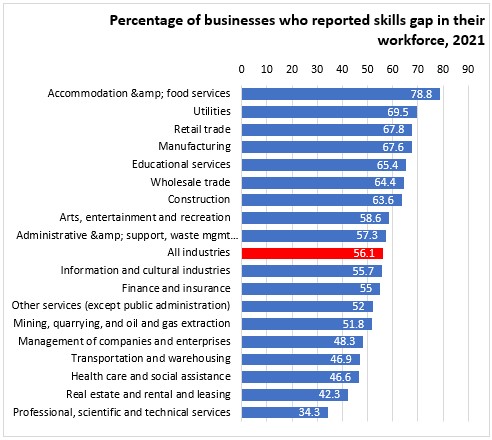The Economics and Statistics Division maintains archives of previous publications for accountability purposes, but makes no updates to keep these documents current with the latest data revisions from Statistics Canada. As a result, information in older documents may not be accurate. Please exercise caution when referring to older documents. For the latest information and historical data, please contact the individual listed to the right.
<--- Return to Archive
For additional information relating to this article, please contact:
October 03, 2022SURVEY OF EMPLOYERS ON WORKERS' SKILLS, 2021 The Survey of Employers on Workers' Skills (SEWS) was conducted from March to May 2022. It collected information on employers' skills needs, skills gaps, and human resources practices, including training, talent recruitment and retention programs. The sample size for the SEWS was 17,880 Canadian establishments covering all sectors of activity. The overall response rate was 52.4%.
In 2021, more than half (56.1%) of Canadian businesses reported that their overall workforce was not fully proficient to perform their job at the required level, driven by large businesses with 100 or more employees (93.0%) and businesses with 20 to 99 employees (90.0%). 73.7% of businesses with 5 to 19 employees reported skills gaps in their workforce while one-third (33.1%) of micro businesses with one to four employees reported that their workforce was not fully proficient to perform their job at the required level.
The largest rate among businesses was reported in accommodation and food services, utilities, retail trade, manufacturing, educational services, wholesale trade and construction. The smallest rate was reported by businesses in the professional, scientific and technical services sector and real estate and rental and leasing sector.

More than half (57.5%) businesses reported that the skills need the most improvement were technical, practical or job-specific skills, followed by problem-solving skills (46.2%). On the other hand, fewer than 1 in 10 businesses reported that their workforce needed to improve reading comprehension (3.6%) and basic math and calculating skills (6.8%).
More than two fifths (44.5%) of businesses experienced difficulties to recruit employees due to a lack of interest in the job. Finding candidates who possessed the skills needed to perform the job at the required level proved challenging. The relatively high rates of recruitment difficulties were reported by the businesses in the accommodation and food services (63.2%), manufacturing (57.0%) and construction (54.8%) sectors. The management of companies and enterprises (21.5%) and real estate and rental and leasing (24.5%) experienced lowest recruitment difficulties.
Businesses in Quebec (55.6%) and in the three territories (50.7%) were more likely to report recruiting difficulties. Businesses in Alberta (37.7%) were less likely to report recruiting difficulties.
More than 7 in 10 businesses (71.0%) provided training to their employees in 2021. Businesses with 100 or more employees (97.6%) and businesses with 20 to 99 employees (93.6%) provided training to their employees while (56.4%) of micro businesses with one to four employees provided training to their workers.
Source: Statistics Canada. Survey of Employers on Workers' Skills, 2021
Survey of Employers on Workers' Skills, 2022 (5317)
<--- Return to Archive